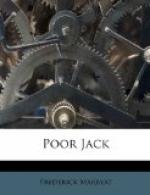My father would repair to the grog-shops to have a dance and carouse with his messmates, and my mother would not accompany him to such a vulgar place; consequently he went alone, was out very late, coming home very drunk, if indeed he came home at all. Moreover, the wives and companions of the other seamen would insult her when she walked out, for pretending to be better than they were.
One day when she was walking out arm-in-arm with my father, unluckily she was met by one of her Woolwich acquaintances. This was the severest stroke of all, as she had intended to return to Woolwich; but now she was discovered, and avoided by one party, as well as insulted by the other. I cannot defend my mother’s conduct; nor indeed was she deserving of pity, as her treatment had been brought about by her own folly and pride. The effect of all this was, however, that of souring her temper still more; and the constant vituperation poured out upon my father so roused his indignation that one evening, when more than usually intoxicated, the “lady’s ladies’ maid” received such a severe box on the ear that the one candle turned to a general illumination. This blow was never forgotten nor forgiven, although my father was very sorry for it, and begged her pardon the next day, with promises of amendment.
Just at this time the French Revolution commenced, and there was expectation of a war with France; the press-gangs were ordered out, and the seamen, aware of it, remained concealed until they should leave the town. But my mother had made up her mind. She found out an officer who commanded one of the press-gangs, gave her address, and, having supplied my father with spirits until he was stupefied, she let in the gang, and before morning my father was safe on board of the tender lying off the Tower. This treachery on her part my father did not discover until some time afterward; and it was the occasion of a scene between them, as I shall hereafter show. The next day my mother went on board of the tender to visit my father, put her cambric handkerchief to her eyes, pressed his hand between the iron bars, and lamented his hard fate, and her hard fate; but when requested by him to smuggle a little liquor in a bladder to comfort him with, she tossed up her head, and declared “that nothing could induce her to do anything so ungenteel.” Whereupon my father turned away, lamenting the day that ever he had married a lady’s ladies’ maid.
A day or two afterward my mother brought my father his kit of clothes, and two pounds of his own money. As a war was expected, my mother would have persuaded my father to give her his “will and power” to receive his prize money; but my father, grown comparatively wiser, positively refused. He turned away on his heel, and they parted.




